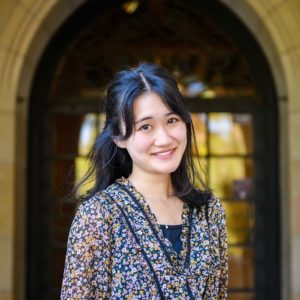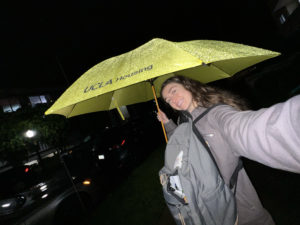This post was updated Oct. 13 at 8:36 p.m.
When I first learned about coffee chats, I thought I would never incorporate them into my life. I despise coffee, and I dreaded the idea of talking to a stranger without a quick exit.
Yet, a year later, I have embarked on over 30 coffee chats.
While I hate coffee, I can now say I love coffee chats.
Luckily for me, I learned that a coffee chat does not require coffee. The term refers to a relatively short informal conversation. Coffee chats can be done with other peers, a professor, an alumnus of the school you attended or someone in the industry you are interested in – a person you can learn from, which is just about anybody.
Coffee chats can be done in person or virtually. This fact put me at ease, as leaving a virtual conversation is easier than one in person. If the conversation was going poorly – to the point where it was unbearable – I could simply say that a last-minute meeting was scheduled, and I had to leave. I would just have to click the “leave meeting” button and message them later with an apology.
Crisis averted.
Fortunately, none of my coffee chats have ended for that reason.
Instead, I have left these conversations with information about the industries I am interested in, a reimagination of my future and even some friends.
One of my first coffee chats was with a public diplomacy graduate student attending the University of Southern California. I reached out to her because I was intrigued by public diplomacy and was considering applying for the same program she was currently enrolled in.
She had pivoted from psychology and biology to public diplomacy, and I was impressed by her ability to succeed in all of her academic pursuits. As a philosophy and history double major with a minor in education studies myself, I knew that my career interests were leaning increasingly toward law and policy. I was eager to learn how I could prepare myself to transition into the workforce when my academic background has been criticized for being impractical.
As I continued asking questions, her answers quieted my anxieties about pivoting between academic interests. She was confident in my ability to take on a graduate-level degree in another discipline and noted the passion in my voice.
Although I have since realized that my career interests for the near future are more related to domestic politics than public diplomacy, I think fondly of our conversation and continuously appreciate her advice.
Soon after, I had a coffee chat with another graduate student. The two of us were similar because of our accelerated education. While I was 17 years old and a junior at UCLA, she was 19 years old and a first-year graduate student at Georgetown University studying democracy and governance.
I asked if people underestimated her because of her age. She said that people called her crazy constantly.
She added that she regretted not pursuing research sooner. She felt as though she had all the time in the world because she was a freshman. She would end up graduating after only two years of her undergraduate education because of financial constraints.
I reflected on my thought process. While I rarely remained complacent, I noticed that I had a habit of thinking about graduate school applications as being “so long away” from the present. Yet, based on what she was telling me, that mentality was detrimental to her educational path.
She urged me to pursue research as soon as possible and to think long-term. I took her advice seriously and applied to research programs, determined to earn opportunities and have the necessary experience to excel in research labs in the future.
For the first time in years, I felt understood. I often felt alone in being disadvantaged because of an assumed lack of life and work experience, even if I knew that statistically that was unlikely.
Speaking to her felt like talking to an older and wiser version of myself. If all goes to plan, I will also be 19 years old and a first-year graduate student.
Whenever I have even the slightest doubt if I can accomplish a goal because of my age, I think back to that coffee chat.
“You don’t have to be conventional to be successful,” she said.
A more recent coffee chat that has helped me grow as both a student and a person was with a rising second-year computer science student at UCLA.
I had posted on LinkedIn that I was accepted to an artificial intelligence policy hackathon hosted by Carnegie Mellon and was looking for advice on how to do well in hackathons. It was my first time competing in this sort of event, and I knew I was unprepared.
She reached out to me saying that she was willing to speak with me. She had competed in a few hackathons and had even won awards at two of them.
We started the coffee chat with her answering common questions about how hackathons work, what to expect and how to work under pressure.
As we continued our call, I found myself laughing at her jokes and asking questions about her experiences outside of hackathons. With a shared interest in technology policy and ethics, we spent over an hour talking about our research and plans for the future.
She talked about her research related to ethics and sustainability in technology, while I talked about the research I assist with at Stanford pertaining to deliberations between participants from the United States, Brazil, Spain and Germany, as well as their impact on public trust in generative artificial intelligence. Throughout our discussion about our research, I realized how I could apply my studies as a philosophy major in a world of rapidly-developing technology with outcomes that hurt some demographics more than others.
Listening to her speak about her hackathon experiences and what she learned from them encouraged me to pursue policy hackathons. While they are unbelievably stressful, the collaborative nature and exciting projects that are created are what, in part, make hackathons so popular.
Before we ended the call, we exchanged Instagrams. My team ended up placing in the top three at the AI policy hackathon in July 2024, and I later reached out again to thank her for her advice and encouragement.
Months later, we still talk – about anything on our minds. We talk about our friends and life outside of academics, and we support each other during difficult times.
While we initially connected over my success of being accepted to Carnegie Mellon’s AI policy hackathon, I found myself sharing some of my failures with her. Being vulnerable with my peers has always been a struggle since many assume that because of my academic accomplishments, I experience less than others.
She talked me through my concerns with balancing my internships and fellowship and gave me advice on how I could navigate the challenges of many commitments. I felt comforted by her words, knowing that I am not alone in feeling overwhelmed with my studies at UCLA and work elsewhere.
Throughout all my coffee chats, I have been guided and comforted by people from several industries and with differing perspectives.
Despite my strong dislike for the beverage and my initial hesitance toward this form of communication, I have come to love coffee chats, finding undeniable value in them.





Comments are closed.